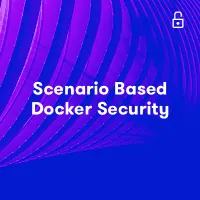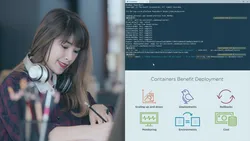
Scenario Based Docker Security 
This Scenario Based Docker Security course is the second part of a four-course learning path. It covers topics such as resource restrictions, Seccomp, SSL certificates, private repositories, custom images, Docker Bench, and deploying and securing an application's backend. Through this course, learners will gain the knowledge and skills to properly configure and secure Docker containers. ▼
ADVERTISEMENT
Course Feature
![]() Cost:
Cost:
Free Trial
![]() Provider:
Provider:
A Cloud Guru
![]() Certificate:
Certificate:
Paid Certification
![]() Language:
Language:
English
![]() Start Date:
Start Date:
On-Demand
Course Overview
❗The content presented here is sourced directly from A Cloud Guru platform. For comprehensive course details, including enrollment information, simply click on the 'Go to class' link on our website.
Updated in [February 21st, 2023]
[Course Title]: Scenario Based Docker Security
[Course Content]: This Scenario Based Docker Security course is the second course of a four-course learning path related to securing containers. Learners will gain an understanding of how to properly install and configure Docker, as well as how to use Linux cgroups and Seccomp to limit resources and process usage. They will also learn how to create and secure software sources, such as container images, using SSL certificates and private repositories. Additionally, learners will gain an understanding of Docker Bench and how to use it to optimize security. Finally, learners will be able to deploy and secure an application's backend, including configuring a Docker container to run an Apache web server, creating a custom image to run a Python application, and setting up an Apache web server as a reverse proxy. This course is essential for anyone looking to gain a comprehensive understanding of Docker security.
[Applications]
This Scenario Based Docker Security course provides a comprehensive overview of the security aspects of Docker. After completing this course, learners will be able to install and configure Docker properly, understand the importance of resource restrictions, create seccomp profiles, secure software sources, create custom images, use Docker Bench for security optimization, and deploy and secure an application's backend. Learners can apply this knowledge to their own projects by using the techniques learned in this course to ensure that their Docker containers are secure and properly configured.
[Career Paths]
Recommended Career Paths:
1. Docker Security Engineer: Docker Security Engineers are responsible for ensuring the security of Docker containers and applications. They must be knowledgeable in areas such as Linux cgroups, Seccomp, SSL certificates, private repositories, custom images, and Docker Bench. They must also be able to create custom images from scratch, deploy and secure applications, and configure Docker containers. As the use of Docker containers continues to grow, the demand for Docker Security Engineers is expected to increase.
2. DevOps Engineer: DevOps Engineers are responsible for the development, deployment, and maintenance of applications. They must be knowledgeable in areas such as Linux cgroups, Seccomp, SSL certificates, private repositories, custom images, and Docker Bench. They must also be able to create custom images from scratch, deploy and secure applications, and configure Docker containers. As the use of Docker containers continues to grow, the demand for DevOps Engineers is expected to increase.
3. Cloud Security Engineer: Cloud Security Engineers are responsible for ensuring the security of cloud-based applications and services. They must be knowledgeable in areas such as Linux cgroups, Seccomp, SSL certificates, private repositories, custom images, and Docker Bench. They must also be able to create custom images from scratch, deploy and secure applications, and configure Docker containers. As the use of cloud-based services continues to grow, the demand for Cloud Security Engineers is expected to increase.
4. Security Analyst: Security Analysts are responsible for identifying and mitigating security risks. They must be knowledgeable in areas such as Linux cgroups, Seccomp, SSL certificates, private repositories, custom images, and Docker Bench. They must also be able to create custom images from scratch, deploy and secure applications, and configure Docker containers. As the use of Docker containers continues to grow, the demand for Security Analysts is expected to increase.
[Education Paths]
1. Bachelor of Science in Computer Science: This degree program focuses on the fundamentals of computer science, such as programming, software engineering, and computer architecture. It also covers topics such as artificial intelligence, data structures, and algorithms. With the increasing demand for software developers and the growing need for cybersecurity, this degree path is becoming increasingly popular.
2. Bachelor of Science in Cybersecurity: This degree program focuses on the security of computer systems and networks. It covers topics such as cryptography, network security, and digital forensics. With the increasing need for cybersecurity professionals, this degree path is becoming increasingly popular.
3. Master of Science in Information Security: This degree program focuses on the security of information systems and networks. It covers topics such as risk management, security architecture, and security engineering. With the increasing need for information security professionals, this degree path is becoming increasingly popular.
4. Master of Science in Cybersecurity: This degree program focuses on the security of computer systems and networks. It covers topics such as cryptography, network security, and digital forensics. With the increasing need for cybersecurity professionals, this degree path is becoming increasingly popular.
Course Provider

Provider A Cloud Guru's Stats at AZClass
Discussion and Reviews
0.0 (Based on 0 reviews)
Explore Similar Online Courses

LSTM Time Series Prediction Tutorial using PyTorch in Python Coronavirus Daily Cases Forecasting
![Docker Tutorial for Beginners [FULL COURSE in 3 Hours]](/ccsimg/td_book/check/dd5e61e0b65637f50fa75703046e5fda.webp)
Docker Tutorial for Beginners [FULL COURSE in 3 Hours]

Python for Informatics: Exploring Information

Social Network Analysis

Introduction to Systematic Review and Meta-Analysis

The Analytics Edge

DCO042 - Python For Informatics

Causal Diagrams: Draw Your Assumptions Before Your Conclusions

Whole genome sequencing of bacterial genomes - tools and applications

Managing Docker on Linux Servers

Fundamentals of Docker and Kubernetes for NET Developers


Start your review of Scenario Based Docker Security